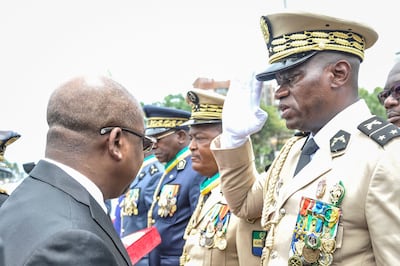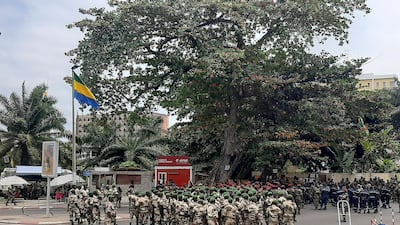Gen Brice Oligui Nguema, who took control of Gabon last week in a military power grab, was sworn into power officially on Monday.
The general in the country’s Republican Guard, who ousted President Ali Bongo following a hotly contested election, which some observers said was a flawed poll.
Speaking to applause and standing ovations Monday, Gen Oligui Nguema said the military had seized power without bloodshed and promised to return power to the people by organising free, transparent and credible elections.
“With the new government, made up of experienced people, we’re going to give everyone a chance to hope,” he said.
Mr Bongo was set to win the vote, until the military shut down movement in the capital, Libreville, and took over key state institutions. There had been reports of voting irregularities.
By taking the helm as “transitional president”, Gen Oligui Nguema will end the 55-year Bongo dynasty.
The former ruling family had been widely accused of corruption, and youth unemployment is soaring in the West African country of 2.3 million people.

Other countries have not acknowledged him as Gabon's legitimate leader and he faces pressure to spell out his plans for restoring civilian rule.
He was lifted up triumphantly by his troops following the announcement of the coup, and in the days since has been seen flanked by generals and colonels.
He has repeated his promise to organise “free, transparent, credible and peaceful elections”, without specifying when they would take place but saying that a new constitution must first be adopted by referendum.
On Friday, he vowed to create more democratic institutions that respect human rights, but said he would proceed “without haste”.
A fringe of the former opposition is urging Gen Nguema to hand over power, but many people in Gabon seem happy about the overthrow of the Bongo dynasty, with celebrations in the streets of the capital Libreville and the economic hub of Port-Gentil.
Several Western countries and organisations have condemned the coup while acknowledging that it is different to others on the continent due to concerns over the credibility of the vote itself.
“Naturally, military coups are not the solution, but we must not forget that in Gabon there had been elections full of irregularities,” said the European Union's foreign policy chief Josep Borrell.
Since the overthrow, Gen Nguema has held hours of high-profile discussions with business and religious leaders, unions, political parties, NGOs, diplomats, and journalists, and has been taking notes and responding at length to questions and grievances.
Former president Bongo had been seeking his third term in office after coming to power in 2009 following the death of his father Omar, who ruled Gabon with an iron fist for over 40 years.
The coup leaders said Wednesday they had put him under house arrest and placed him “in retirement”.
But Mr Bongo managed to distribute a video on social media where he said his son and wife Sylvia had been detained, appealing to “all friends that we have all over the world … to make noise” on his behalf.
National TV on Friday showed rolling images of the deposed president's son Noureddin Bongo Valentin and other arrested officials in front of suitcases filled with cash allegedly seized from their homes.
The military has accused them of treason, embezzlement, corruption and falsifying the president's signature, among other allegations.
Five other countries in Africa– Mali, Guinea, Sudan, Burkina Faso and Niger – have undergone coups in the last three years. Their new rulers have resisted demands for a short timetable for returning to barracks.

